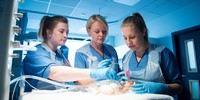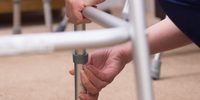Frequently Asked Questions
Thank you for working with students in practice settings and for taking the time to consider their needs and to support their learning. This section is designed to answer frequently asked questions. If you need further information having read this section, please do not hesitate to get in touch either with your Practice Education Facilitator or with any of the University Practice Learning Leads. We are grateful for your support of the students and are delighted to answer questions you may have.
Attendance and Duty Rotas
Can a student undertake all shift patterns?
Yes, a student nurse/midwife is required by the NMC to experience a full range of shifts during their education. This includes day and night duties as well as Monday-Sunday rotas.
How long are a student’s shifts?
Students can complete core shifts (8 hours) or full day ’12 hour’ shifts (12.5 hours). Unlike employed staff, students do not have break time omitted from shift time. This means they can count break time in the total number of clinical hours.
Can students organise their own off-duty?
In some clinical areas it has become customary for students to choose their own duty rota and in some areas this works well. However, the expectation is that students will usually be allocated a duty rota which allows a clinical area to ensure a spread of students and adequate support over the course of each week. Students should not expect to determine their own duty rota. Of course, many do appreciate flexibility where that is possible.
If a student is doing work at home, does that count as clinical placement hours?
This time can be counted as clinical placement hours, with the prior agreement of the practice supervisor or assessor, as long as it is directed learning which is appropriate to the clinical area. Students do not need time away from the clinical area to complete University work.
Do students need time off to study?
Students should not typically require time off to study. Some study days do occur during practice learning experiences (eg manual handling training) but with the exception of these study days, there should be no requirement for additional study time away from the clinical area. If a student as a recurring study day during a placement, this should be communicated to the clinical area beforehand.
Can students take annual leave or holidays?
No, annual leave is incorporated into the student’s programme at intervals throughout the year so there is no provision for annual leave while in practice learning environments.
What happens if a student is sick?
A student should phone the clinical area to report sickness absence. He/she should also contact their University contact for sickness. A student may request to make up sickness absence during a subsequent week of placement. This may be possible in some areas but may not be possible in every clinical area. Students may not extend the length of a practice learning experience to make up sick time without prior arrangement with the Allocations Team.
My student works part time and has asked to work fewer hours in placement. Is that allowed?
Students have a required number of hours or shifts per placement. Students should be undertaking all of these hours and should not be absent in order to undertake part time work. We know that a lot of students have to work to support their studies and this may result in occasional requests to amend a shift time or swap off duty. Students know that practice learning requirements must be prioritised and requests of this kind will only be supported if it is possible within a practice learning environment. Students are told that it is likely to more difficult to fulfil multiple requests for a student or to fulfil requests where there are large numbers of students in a clinical area.
What are reasonable adjustments?
Some students may need ‘reasonable adjustments’ in order to participate fully in practice learning. Examples of this may include additional time for record keeping for a student who is dyslexic, amended shift patterns to address fatigue or adjusted duties during a post-surgical recovery.
How do I know what adjustments a student may need?
A student will share his/her adjustments with you as soon as possible. The Universities can support the student to share his/her requirements but the onus is on the student themselves, as adult learners, to notify you of their needs. Where this requires to be done in advance of placement beginning, Universities will support students to make advanced contact with a clinical area. If you have any queries about the adjustments please ask the student but also feel free to contact the Academic Assessor or member of University staff for advice. We are keen to help you make adjustments effectively but also in a way which suits your clinical area.
How many hours should a student work in practice learning?
With a range of different nurse and midwife education programmes, there are some students doing part time placement weeks. The student should be clear about how many hours are expected. In addition, the allocation information received by your clinical area should state what hours are required by the student.
Clinical Skills
What clinical skills can students do in a first placement?
Each nurse/midwife education programme is slightly different and skills teaching takes place at different times in different universities. You can read more about this in the University specific areas of this website (LINK). While there is some streamlining across the locality, the students should generally undertake skills in practice after they have completed the classroom learning to inform that practice.
In some clinical areas staff are willing to give students the underpinning teaching to allow them to practice a skills which is used frequently in a specific clinical area. This is appreciated by students when it is.
My student is keen to learn skills we do not routinely use in my clinical area. What should I do?
Students have the whole length of their programme to develop proficiency in the large range of skills required for registration. You can encourage them to develop and consolidate skills used commonly in your clinical area. It is sometimes possible to arrange learning opportunities in associated clinical areas to extend the skills repertoire. This is something the student can arrange with your support.
Can students undertake venepuncture and cannulation at any stage of the programme?
Nursing students undertake venepuncture and cannulation education during part 3 of their nurse education programme. They can not practice these skills until after they have completed this education. During part 3 of the programme they may be glad of supervised practice opportunities.
Midwifery students will undertake venepuncture during part 1 of their midwife education and will be able to practice this on their first placement.
My student has come with lots of previous work experience. What should I do to help them when they know a lot already?
Students all learn at their own rates and come with an increasing range of previous work and life experience. They can be encouraged to set their own personal learning outcomes for their time in your clinical area. This will require them to consider their strengths and learning needs. Sometimes those with work experience have worked in different roles and need support to explore the skills and attributes which are more specific to the role of a registered nurse. There are sometime opportunities to unpick bad habits and reflect on different approaches to practice. Everyone has something to learn! Don’t be afraid to challenge the student to consider their own learning needs and to highlight the skills they still need to develop as this helps them to consider their own lifelong learning.
Practice Supervisor and Practice Assessor Roles
How can I become a Practice Assessor?
You can become a Practice Assessor when you feel able to undertake this role. You should discuss this development with your line manager. In order to prepare for the role you can undertake independent learning using the resources on the NHS Education for Scotland website (link) and can attend a local workshop to support you to make the final step to an assessor role. Your local PEF/CHEF can support this.
Is a Practice Supervisor the same as a mentor?
A Practice supervisor is not exactly the same as a mentor. The role is defined by the NMC and is outlined in the Scottish context on the NHS Education for Scotland website (Link).
A student has told me that they no longer need mentors. Is this true?
Student are no longer supported in practice learning environments by mentors. This is terminology that, over time, students will begin to stop using. However, they do require the support of a Practice Supervisor and Practice Assessor and still work under appropriate supervision while in clinical areas.
Is there a register of supervisors and assessors?
No, this is no longer required by the NMC. Your line manager can record your preparation to be a supervisor or assessor on your employment file so that your supervisor or assessor role can be fully recognised within your clinical role. This will also help a ward manager to allocate appropriate supervisors and assessors to students.
Can I be both a Practice Supervisor and a Practice Assessor?
You can not be both Practice Supervisor and Assessor for the same student. You may hold both roles for different students. For example, you may have one student to supervise and one student to assess during a placement block.
How do I contact an Academic Assessor?
The Academic Assessor is based in the University and is always willing to be in contact with you to discuss a student’s progress or challenges and to answer any questions. The student can help you with contact details for their assessor. The contact information is also found in the PAD and is also held by the PEF team. Please do not hesitate to contact an Academic Assessor.
I used to be a sign off mentor. Should I still only be looking after student in their last placement?
Sign off mentors are no longer required by the NMC. You are welcome to supervise students at any stage of their programme. You may also wish to be an assessor which means you could continue to assess students both in their final placement and in earlier learning experiences.
Assessment In Practice
Do students have an assessment book or Ongoing Achievement Record?
Under the new NMC standards, students now have a Practice Assessment Document, known as a PAD. The shape of this document is the same for every University in Scotland with a common template which is then amended for each individual programme. University of Edinburgh and Edinburgh Napier University use an electronic version known as the EPAD.
Do all students use the EPAD?
Students from Edinburgh Napier University and University of Edinburgh use EPAD. The electronic platform is based on the Scottish PAD so includes all the same information as the paper-based version used by other universities and in other areas of Scotland.
As an assessor can I have my own access to EPAD?
Assessments in EPAD take place alongside a student. This means that you will take time with the student to offer feedback and document their learning. You can register for an EPAD account but need the student alongside you to complete assessment documentation in EPAD.
How do I access a Risk Assessment for a student commencing practice?
Students are able to deploy the various risk assessment forms via ePad.
These Risk Assessments relate to:
- Student Midwife Case Loading
- New and Expecting Mothers
- Young Persons
How many assessments should a student have while in a learning environment?
Each student can expect an initial conversation during the early days in a practice learning environment, an interim assessment in the middle of the experience and a final assessment, usually during the final week of the practice learning experience.
The PAD assessment page includes all the NMC Platforms. Do I need to complete it all?
Students are assessed under each of the platforms within each practice learning experience so it is helpful if you can add comments to each section of the assessment. This allows a student to see where they can develop and to chart their progress over the course of their learning journey. You should feel free to use examples or to detail specific strengths or weaknesses in these sections.
Do the students need to be assessed in all skills in every placement?
The NMC ask students to fulfil a long list of skills in order to register as nurses/midwives. Proficiency in each skill is achieved over the entire pre-registration programme. This allows students to develop skills that are commonly used in each clinical area that they visit.
Who should I contact if the student is struggling?
You should contact the Academic Assessor if there are concerns about a student. The Academic Assessor has oversight of the student’s academic and practice learning so may be able to spot patterns of behaviour or support your work with the student.
If I fail a student do they get another chance?
A student who fails a placement is offered the opportunity to repeat those clinical hours, usually in a different clinical setting. You must not worry about failing a student when that is necessary and can be assured that no student must leave a programme of nurse education simply because of a single failed practice learning experience.



